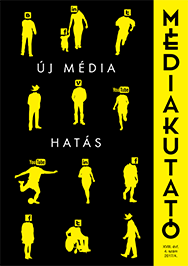Contents – Winter 2017
Fehér, Katalin:
Fehér, Katalin:
Digital identity in personal and professional strategy
This paper presents the changing research trends in digital identity and identifies shifting emphases in academic sources in the last ten years. Thereafter, on samples from the Southeast Asian and Central/Eastern European regions and based on a qualitative research of 60 in-depth interviews, it explores the major personal and professional considerations of digital identity strategy, presenting stories from identity theft to kidnapping. The analysis recalls and compares the previously published summaries of the topic released in this academic journal. The result is an overview of digital identity strategy in different cultures and generations.
Digital identity in personal and professional strategy
Médiakutató Winter 2017 pp. 9-20
Bene, Márton:
Bene, Márton:
Polarising Politicians: Viral content on the Facebook pages of the candidates in the 2014 campaign
The study investigates electoral candidates’ 25 viral posts and their 1822 publicly available shares during the 2014 general election campaign in Hungary, using both qualitative and quantitative content analysis methods. The paper’s main aim is to disclose how these posts got viral. It focuses on the content and interactive aspects of virality: it explores what common and/or special features these posts have, the way they are shared and the reactions they received after being shared. The findings show the prominent role negativity plays in political virality and one possible theoretical explanation for this phenomenon is also proposed. Further, the study shows that negitivtiy in these viral posts is dominated by morality-based and targeted critics, while policy and substantive criticisms hardly occur. Users shared these posts mainly without adding a contribution of their own and without distortion, while their friends largely ignored the shared contents. The findings also highlight the role highly followed Facebook pages’ shares play in political virality.
Polarising Politicians: Viral content on the Facebook pages of the candidates in the 2014 campaign
Médiakutató Winter 2017 pp. 21-38
Kelemen, Luci:
Kelemen, Luci:
From migrants to covfefe
Keywords: This paper focuses on the lessons learnt from the 2016 US presidential election, especially those of the campaign of the eventual victor, Donald Trump. The content analysis of the local media and the relevant political science models show that the GOP nominee’s win can only be considered a paradigm shift in terms of media usage, but not politics. The “toolkit” of Trump is also likely not reproducible as a whole, and the media attention he received was only extraordinary with regards to its quantity, not its quality.
Médiakutató Winter 2017 pp. 39-58
Bajomi-Lázár, Péter:
Bajomi-Lázár, Péter:
Do legacy media have the power to manipulate audiences?
According to popular view, media have a huge and chiefly negative impact upon public opinion and electoral behaviour and are capable of manipulating audiences. This paper asks the question of whether such concerns are warranted. It offers an overview of academic theories and empirical studies that researchers consider the milestones of media effects research and reception studies. Of these, it focuses upon projects that looked at how media shape political opinion and electoral behaviour, and highlights the limitations of previous research. Contrary to popular view, most researchers argue that media have limited impact. In an attempt to explain why media can hardly affect public opinion and electoral behaviour, this paper concludes by recalling a recent empirical study suggesting that political attitudes are genetically conditioned. Finally, drawing on the findings of media systems theory, it suggests that future research should assess media effects as a function of different media systems.
Do legacy media have the power to manipulate audiences?
Médiakutató Winter 2017 pp. 61-79
Kósa, István:
Kósa, István:
New phenomena in agenda-setting
In this paper I present three types of agenda-setting research that was granted little or no attention in the literature. After a brief overview of publications regarding agenda-setting, I describe the concept of intermedia agenda-setting. Theoretical models of this phenomenon are more concessive in the face of the effects coming from non-mainstream media, than earlier forms (Harder et al. 2017). Next I outline agenda-cueing which originates from online information cues like recommender systems, popularity indicators. I describe – among other things – Stoycheff and his collaborators’ research findings who tried to answer the question of the degree of the effect of a cue coming from traditional news and the degree of one coming from Twitter. Finally, I present a recent and probably the most interesting development of agenda research, namely the issue ownership network model, created by Chris Vargo and Lei Guo (2016).
New phenomena in agenda-setting
Médiakutató Winter 2017 pp. 81-91
Kékesdi-Boldog, Dalma:
Debates around contemporary journalism from the perspective of critical technology research
Médiakutató Winter 2017 pp. 99-101




